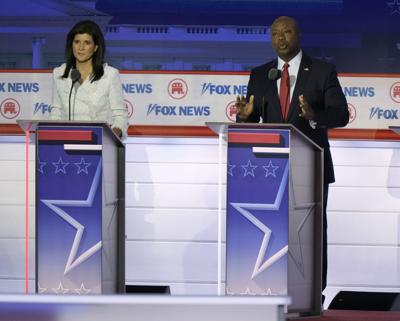COLUMBIA — Former Gov. Nikki Haley saw a fundraising boost in the third quarter while U.S. Sen. Tim Scott’s donations slowed, though both pulled in more than enough to keep their campaigns afloat until voting in the GOP presidential contest begins in January.
After a pair of strong debate performances that have improved her standing in the polls, Haley's campaign raised more $11 million in the third quarter between all of her fundraising committees, the campaign said.
The campaign itself posted a $8.24 million haul — a $3 million increase from last quarter that gives the Kiawah Island resident $11.6 million in cash on hand.
Of that, just over $9 million can be spent in the primary, according to campaign finance reports filed Oct. 15.
Scott's fundraising committees pulled in $5.92 million in the third quarter, his campaign said.
Scott's main campaign account saw a drop in fundraising this quarter, to $4.6 million from $5.9 in the second quarter, when he announced his bid. It’s a troubling sign for Scott, who saw a slight upswing in the polls during the summer as he flooded the airwaves with ads in early states and crisscrossed Iowa and New Hampshire courting voters.
Nonetheless, Scott entered the race with a massive war chest and has $13.3 million on hand, more than anyone in the race save former President Donald Trump. But, Scott filed about $1 million in outstanding bills as debt.
Despite Haley’s big quarter and Scott’s bank account, Trump, the field's undisputed frontrunner, trounced both in the third quarter. His campaign’s fundraising committees raised $24.5 million, a huge boost from his totals earlier in the year that had raised questions about his balance sheet. His campaign now has $37.5 million in the bank.
Haley’s camp celebrated the fundraising, as the former United Nations ambassador has surpassed Florida Gov. Ron DeSantis in polls of New Hampshire and South Carolina and has begun to rival him in national surveys.
The Winthrop University poll earlier this month showed Haley with the support of 17 percent of the Republican electorate in South Carolina, ahead of DeSantis but well behind Trump, who’s got the backing of just over half of the state’s GOP voters. Scott was at 6 percent.
“We have seen a big surge in support and have real momentum,” Olivia Perez-Cubas, a Haley spokeswoman, said in a statement. “Nikki is emerging as the candidate who can move America beyond the chaos and drama of the past and present, and we have the resources we need to do it.”
Though DeSantis’ campaign raised more money than Haley’s in the third quarter, about $11.2 million, he spent nearly all of it. Haley now has about $9.1 million in the bank she’s allowed to spend in the primary as opposed to about $5 million for DeSantis.
Haley’s campaign has been relatively frugal, spending $3.5 million in the third quarter.
Haley's leaner strategy is attractive to big-dollar donors and will help her last longer come primary season, said Amanda Kornegay, a national Republican fundraising consultant who owns Kornegay Consulting.
"Nikki Haley is playing the long game," she said.
Haley's approach is in sharp contrast to Scott’s high-dollar campaign. South Carolina’s junior senator spent $12.37 million in the third quarter and had about $1 million in outstanding bills.
“Tim Scott is the only candidate with the resources and message to win the nomination and beat Joe Biden,” Scott campaign spokeswoman Nicole Morales said in a statement. “This campaign is built for the long-haul and will continue to share Tim’s message to protect the American Dream for generations to come.”
For months, Scott’s campaign and the super PAC backing his bid have invested heavily in early state advertising. In the summer, that strategy seemed to be working as Scott gained ground in the polls. That rise has largely stopped since the debates began.
Scott's fundraising was "decent" this quarter, but right now he's spending too much, too quickly, said Kornegay, who was finance director for U.S. Sen. Rick Santorum's 2012 presidential bid.
"He doesn’t have enough money to get through the end of the year if he spends the same way in the fourth quarter that he did in the third quarter,” she said.
Oct. 16 presented a split screen for Scott's campaign. At a Columbia BBQ restaurant, Scott filed for his home-state primary ringed by adoring supporters. Meanwhile, his super PAC announced it was pulling its TV ads off the air because the spending has not been effective, Politico reported.
Officials for Haley, Scott and DeSantis’ campaigns went before GOP mega-donors searching for an alternative to Trump and made their pitches last week, according to CNN.
The campaign reports only tell part of the story. The candidates’ super PACs, which have been playing a major role in the primary, will report their finances at the end of the month.
They do show that Haley and Scott’s campaigns, both based in Charleston, have acquired a few local tastes.
Scott’s campaign dropped $873 at Magnolias on East Bay Street, $1,131 at High Cotton a few doors down, and $1,304 at the Halls Chophouse locations in Summerville and Columbia last quarter, according to the filings.
Haley’s campaign has spent less on the area’s fine dining, but they’ve rung up $50 at Blondies Bagels & Cafe on Seven Farms Drive near their HQ and a $24.88 bill at Prohibition, a King Street speakeasy-style bar.











